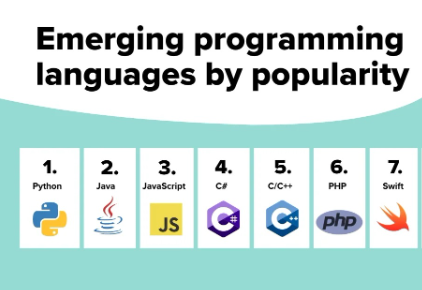
Top 5 Programming Languages for Beginners in 2025
Introduction
Programming is an essential digital skill in 2025. Whether you’re building websites, automating tasks, or exploring AI, choosing the right language is key. In this blog, we’ll explore five beginner-friendly languages, explain their real-world uses, and guide you toward the one that fits your goals.
If you’re new to coding, you might first want to understand what a programming language is or how programming software like editors and IDEs work.
1. Python – The Beginner’s Favorite
Why It’s Great:
- Simple and readable syntax
- Used in web dev, data science, AI, automation
- Massive online community
Use Cases:
- Data Analysis with Pandas
- Web Development with Flask or Django
- Automation using scripts
- Machine Learning with TensorFlow
Example: Automating a folder cleanup script with just a few lines of Python.
Bonus:
Python comes pre-installed on Linux OS like Ubuntu, making it easy to start right away in the terminal.
2. JavaScript – The Language of the Web
Why It’s Great:
- Powers 95% of websites
- Easy to test in the browser
- Works with HTML & CSS
Use Cases:
- Interactive websites
- Game development (e.g., Phaser.js)
- Mobile apps (React Native)
- Backend (Node.js)
Example: Making a button that changes color when clicked — all done with JS!
Tip:
Combine with HTML and CSS to build fully functional web pages.
3. C++ – For Logical Thinkers
Why It’s Great:
- Strong foundation in programming concepts
- Used in system software and game engines
- Object-oriented and efficient
Use Cases:
- Operating systems
- Game engines (e.g., Unreal Engine)
- Desktop applications
Example: Writing a fast calculator program using C++ classes.
Note:
C++ is more complex but offers deep control — ideal for learners serious about system-level programming.
4. Java – Cross-Platform Power
Why It’s Great:
- Write once, run anywhere (thanks to JVM)
- Strongly typed and widely used
- Big in enterprise, Android, and finance
Use Cases:
- Android apps (with Android Studio)
- Enterprise software
- POS systems and online banking
Example: Creating a login system using Java Swing for GUI apps.
Related Tool:
Java works well with IDEs like Eclipse and NetBeans, covered in What is Programming Software?.
5. HTML & CSS – Not Programming, But Essential
Why It’s Great:
- Builds the structure (HTML) and design (CSS) of web pages
- Immediate visual feedback
- Foundation for web development
Use Cases:
- Creating static websites
- Designing blog layouts
- Styling with Bootstrap
Example: Making a personal portfolio page using HTML for content and CSS for styling.
Perfect Combo:
Start with HTML/CSS and then add JavaScript for interactivity.
Which Language Should You Choose?
| Goal | Language |
| Data Science / AI | Python |
| Web Development | JavaScript + HTML/CSS |
| Mobile Apps | Java or JavaScript (React Native) |
| System Programming | C++ |
| Cross-platform Desktop Apps | Java |
Final Thoughts
No matter which language you start with, the key is practice and consistency. Use online platforms like Replit, Visual Studio Code, or Ubuntu’s terminal to write and test your code.
Also explore:


